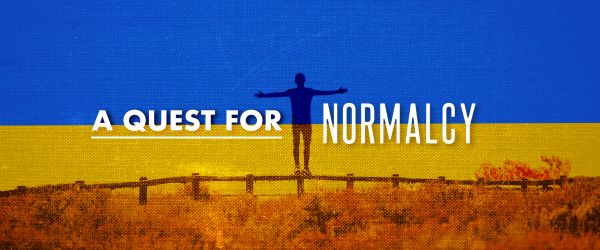
A Quest For Normalcy
By Katala Peterson - SEND North
“Today also my complaint is bitter; my hand is heavy on account of my groaning. Oh, that I knew where I might find him, that I might come even to his seat! I would lay my case before him and fill my mouth with arguments. I would know what he would answer me and understand what he would say to me. Would he contend with me in the greatness of his power? No; he would pay attention to me.”
- Job 23:1-6, ESV
As the crisis in Ukraine continues to mount, there’s a palpable tension in various areas of the world. In the wake of current world events, discomfort hangs heavy. It seems caustic to be concerned about the cost of living when conflict and suffering is at hand. We are seeking reconciliation to the norm. The world consistently feeds us a perspective to chase happiness and restoration. Our comfort inevitably arises as a concern in a selfish world but we know joy sits in the hands of the Father who is willing and able to do many things– even if we don’t always see complete restoration and peace quickly or even on this side of eternity. During times of conflict, our hearts are pricked by the awareness of suffering and made all the heavier knowing how comfortable we are in comparison.
Deeper into that word – discomfort, what are we truly feeling? Grief, disappointment, fear, or uncertainty? It’s both an emotional experience and a physical look at how our bodies carry tension. Humans were created for Eden. We were designed to have perfect fellowship with God and live in peace. There was no death, destruction, or selfish ambition in the garden. Our central nervous systems are disrupted by chaos and stress as a result of living in an imperfect world.
Our hearts are heavy because we are made in the image of God and suffering breaks his heart too. Rather than losing ourselves in anger, despair, and fear of what the sinful nature of greed and destruction may lead to, allow your uncertainty to turn to longing for the fullness of what only Christ can offer.
"For we know that if the tent that is our earthly home is destroyed, we have a building from God, a house not made with hands, eternal in the heavens. For in this tent we groan, longing to put on our heavenly dwelling, if indeed by putting it on we may not be found naked. For while we are still in this tent, we groan, being burdened—not that we would be unclothed, but that we would be further clothed, so that what is mortal may be swallowed up by life. He who has prepared us for this very thing is God, who has given us the Spirit as a guarantee." - 2 Corinthians 5:1-5, ESV
Scripture says our sadness with the brokenness of this world is natural, as is our disappointment when things don’t go well (verse 2-3). He prepared us for this moment and even if the world gives way, we are not hopeless or abandoned. My heart is encouraged by the story of Job who experienced anger, shame, grief, and God still chose to count him as faithful with all the questions and all of the feelings he had. The same grace is extended to us.
You do not need to grieve ‘perfectly’ in order to cry out to God. Job literally issued a complaint to God about the state of his world. Not only is change and political unrest terrifying, but the potential shifts in cost of living, changes in cultural norms, and political gains to be made are scary. You are allowed to pray without ceasing for the safety of those in desolation, the comfort of missionaries, and your fear of financial lack if this changes your life. He cares for you and your sadness. We feel grief not because we are broken but because we are made in the image of God living in a broken world. Our grief is symbolic of our desire to be in unity with Him.
“So if there is any encouragement in Christ, any comfort from love, any participation in the Spirit, any affection and sympathy, complete my joy by being of the same mind, having the same love, being in full accord and of one mind. Do nothing from selfish ambition or conceit, but in humility count others more significant than yourselves. Let each of you look not only to his own interests, but also to the interests of others. Have this mind among yourselves, which is yours in Christ Jesus, who, though he was in the form of God, did not count equality with God a thing to be grasped, but emptied himself, by taking the form of a servant, being born in the likeness of men. And being found in human form, he humbled himself by becoming obedient to the point of death, even death on a cross.” -Philippians 2:1-8, ESV
We find unity through praying for believers who are suffering amidst the conflict. In our questions, fear, and uncertainty, we look to the example of Jesus; He surrendered His comfort for the sake of seeing God glorified and known. The experience of discomfort urges our hearts to pray, give, and advocate for the Ukrainian people. When we acknowledge the brokenness while fiercely praying for change, we are drawn near to each other and to Christ rather than separated by fear. Today, allow yourself to have the questions Job himself did – while still following in his example to bring them directly to the Lord as we wait and pray for peace.
Find more information on the Ukraine Updates page.
Please Consider:
- Praying – Visit our prayer guide, “11 ways to pray during the crisis in Ukraine”
- Giving – Your donation today prepares us to respond to acute needs as they arise and 100% of donations to Help Ukraine go to crisis response.
- Advocating – Use this this downloadable prayer guide and slide to lead a time of prayer at your church or share with friends.
Additional Posts





